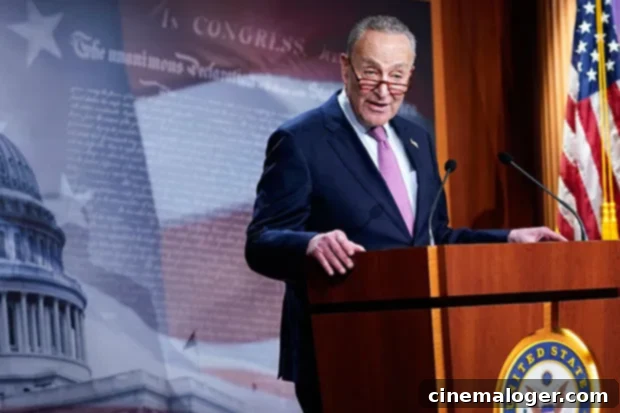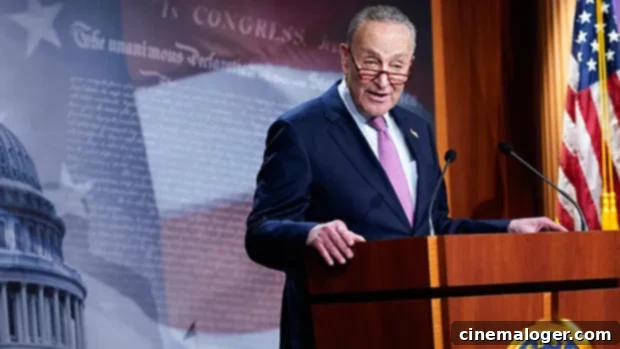Chuck Schumer’s Viral ‘Erection’ Gaffe Stuns During Historic Trump Impeachment Trial Announcement
A routine announcement regarding the impending impeachment trial of former President Donald Trump took an unexpected and hilariously awkward turn when Senator Chuck Schumer, the Senate Majority Leader, misspoke during a televised address. In a moment that quickly went viral, the veteran lawmaker accidentally uttered ‘erection’ instead of ‘insurrection,’ providing a much-needed comedic interlude amidst the gravitas of a historic political event.
The incident occurred as Senator Schumer, 70, was informing the nation about the procedural next steps for the House’s article of impeachment against Donald Trump, specifically focusing on the charge of “incitement of insurrection.” He announced that the article would be formally delivered to the Senate on Monday, January 25, marking the official commencement of the Senate’s unprecedented second impeachment trial for a former president. Despite the solemnity of the occasion and the profound implications of the trial, Schumer’s brief but memorable linguistic misstep overshadowed the gravity of his message for a fleeting, unforgettable moment.
He incited the what? pic.twitter.com/T57FrN2X0q
— Rex Chapman🏇🏼 (@RexChapman) January 22, 2021
The Unfortunate Slip-Up That Went Viral
Senator Schumer began his statement with a clear and determined tone, outlining the process ahead: “I have spoken to Speaker Pelosi who informed me that the articles will be delivered to the Senate on Monday.” He continued, emphasizing the gravity of the upcoming proceedings: “The Senate will conduct a trial of the impeachment of Donald Trump. It will be a full trial. It will be a fair trial. Make no mistake: there will be a trial, and when that trial ends senators will have to decide that they believe Donald John Trump incited the erection — insurrection — against the United States.” The pause, the slight widening of the eyes, and the quick correction were unmistakable, even to the most casual observer. The immediate shift in Schumer’s demeanor, from firm resolve to momentary embarrassment, was palpable, transforming a serious political address into an instant, viral sensation.
This particular gaffe struck a chord with viewers and quickly spread across social media platforms. The close phonetic similarity between “erection” and “insurrection,” coupled with the high-stakes political context, created a perfect storm for internet humor. Senator Schumer’s visible shudder and immediate self-correction only added to the candid, human element of the moment, making it relatable and endlessly meme-worthy. It served as a stark reminder that even the most seasoned politicians, under immense pressure, can have their moments of linguistic vulnerability, providing a brief, albeit unintended, moment of levity in an otherwise tense political landscape.
The Internet Reacts: A Wave of Hilarious Commentary
The reaction on Twitter was swift, merciless, and overwhelmingly hilarious. Users immediately seized upon the slip-up, turning it into a trending topic within minutes. “Trump is a total dick that’s true… but this is taking it a little too far,” one Twitter user quipped, capturing the essence of the double entendre. Another joked, “Insurrections that last more than 4 hours should seek impeachment attention immediately,” playing on well-known pharmaceutical advertisements with a clever political twist. The humor ranged from pointed political commentary to purely anatomical puns, illustrating the public’s ability to find lightheartedness even in the midst of serious national discussions. The incident quickly became a source of bipartisan amusement, briefly uniting internet users in shared laughter over a politician’s unfortunate but comical mispronunciation.

Context of the Historic Impeachment Trial: Donald Trump’s Second Impeachment
While Schumer’s gaffe provided a moment of levity, the underlying event it announced was anything but. The upcoming Senate impeachment trial represents a truly historic and unprecedented moment in American political history. Donald Trump was impeached by the House of Representatives for the second time on January 13, 2021. This rapid impeachment followed his alleged role in inciting a violent insurrection at the U.S. Capitol just one week prior, on January 6th. On that day, a mob of his supporters stormed the Capitol building, disrupting the certification of President Joe Biden‘s electoral victory and leading to widespread chaos, vandalism, and loss of life. The charge against Trump, “incitement of insurrection,” stems from his repeated rhetoric challenging the election results and his speech to supporters just hours before the attack, urging them to march to the Capitol.
The fact that Donald Trump became the only president in United States history to be impeached twice underscores the extraordinary circumstances surrounding his presidency and departure from office. Prior to Trump, only two other presidents, Andrew Johnson in 1868 and Bill Clinton in 1998, had faced impeachment by the House. Both were acquitted by the Senate. Trump himself faced his first impeachment trial in early 2020 on charges of abuse of power and obstruction of Congress related to his dealings with Ukraine, from which he was also acquitted. This second impeachment, occurring after he had already left office, adds another layer of historical complexity and legal debate, with some arguing about the constitutional validity of impeaching a former president.
The Impeachment Process and Charges Explained
The impeachment process in the United States is a two-step procedure. First, the House of Representatives votes to impeach, essentially bringing charges against a federal official. Once impeached by the House, the articles of impeachment are sent to the Senate, which then conducts a trial. In the Senate trial, House members act as prosecutors (known as impeachment managers), and the impeached official’s legal team presents the defense. Senators serve as jurors, and the Chief Justice of the Supreme Court typically presides over the trial of a sitting president, though in this case, a former president, the role of presiding officer was expected to be filled by the Senate’s most senior member or a specifically designated senator.
To convict an impeached official, a two-thirds majority vote is required in the Senate. This threshold, representing 67 votes in the 100-member body, makes conviction a high bar to clear, especially when political parties are often divided along partisan lines. The specific charge against Donald Trump, “incitement of insurrection,” alleges that he intentionally encouraged and facilitated the violent assault on the Capitol. This charge focuses on his actions and rhetoric leading up to and during the events of January 6th, arguing that he breached his constitutional duty to protect the nation and its democratic institutions.
What’s at Stake for Former President Trump: Beyond the Presidency
Should Trump be convicted in his Senate impeachment trial — an outcome that would also be a first, as no president has ever been convicted — the consequences would be significant and far-reaching. Beyond the historical stain of conviction, Trump stands to lose a number of privileges typically bestowed upon former presidents. These include a lifelong Secret Service detail, a substantial yearly pension currently set at over $200,000, and a large travel stipend to support official activities. These benefits are granted under the Former Presidents Act to assist ex-presidents in their post-presidency public life and duties.
Crucially, a conviction could also lead to a separate Senate vote, requiring only a simple majority, to bar Trump from ever running for federal office again. This particular consequence carries immense weight, especially given his repeated hints and outright threats of a 2024 presidential run. Preventing a former president from seeking future office would be an unprecedented move with profound implications for American democracy and the future of political leadership. It would send a powerful message about accountability and the boundaries of presidential conduct, signaling that even after leaving office, a president can be held responsible for actions deemed to have violated their oath and endangered the nation.
The Senate’s Role and the Path Forward
Senator Schumer’s commitment to a “full trial” and a “fair trial” highlights the Senate’s solemn responsibility in these proceedings. The decision facing senators is not merely a legal one but also deeply political and moral. Each senator will have to weigh the evidence presented by the House impeachment managers against the defense offered by Trump’s legal team, ultimately deciding whether Donald Trump’s actions constituted an impeachable offense warranting conviction. The trial will undoubtedly involve intense debate, witness testimonies, and a thorough examination of the events leading up to and during the Capitol attack.
The outcome will have lasting repercussions, not only for Donald Trump personally but also for the standard of presidential conduct, the future of the Republican party, and the stability of American democratic institutions. As the nation prepares for this historic legal battle, Schumer’s gaffe, while a moment of accidental comedy, serves as a poignant reminder of the human element present even in the most serious of political dramas. It underscores the intense scrutiny and pressure under which public officials operate, where every word, every gesture, can be amplified and scrutinized, especially when discussing an event as critical as a presidential impeachment.
